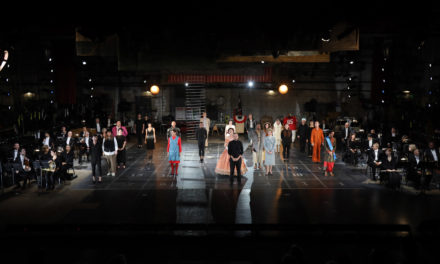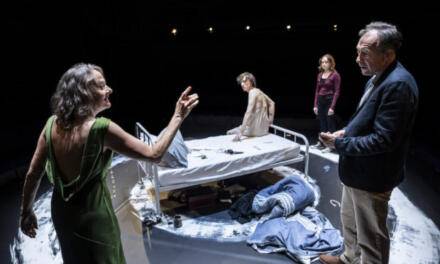This February, International City Theatre will present the world premiere of a new play, Marilyn, Mom & Me written and directed by Luke Yankee. This autobiographical play is about the playwright interviewing his mother, renowned theater and screen actress Eileen Heckart (The Bad Seed, Butterflies Are Free, The Waverly Gallery), about her relationship with Marilyn Monroe during the filming of the 1956 film Bus Stop. By unraveling Heckart’s very complex relationship with Marilyn Monroe, Yankee also explores the truths about his relationship with his mother. After several readings and workshops, both in person and on Zoom, the play will have its world premiere in Long Beach. I had the chance to discuss the play with Luke from his home in Palm Springs, California.
Colden Lamb: How did the idea of this play come about?
Luke Yankee: My mother loved to tell stories of her experiences on Broadway and in Hollywood. When people pressed her about working with Monroe during the filming of Bus Stop, she had two sets of stories. One was about this woman who was very unprofessional, showing up late and with a bad habit of not knowing her lines. The other story was about this woman who was so lost, longing to have a child of her own and so desperate to receive love, even with all she had achieved. To the day my mother passed away, she couldn’t talk about that side of Marilyn without bursting into tears. That, in and of itself, says a lot. My mother was what one would call “a tough customer.” Nobody else had that impact on her.
After my mother’s passing, I became interested in learning about her relationship with this woman who became one of the most iconic stars of all time. While I was listening to some audiobooks about Marilyn, I began to see similarities between my mother and her, despite these women appearing to be opposites on a surface level. Both of them shared similar wounds, both had difficult childhoods, estranged parental figures, and tremendous abandonment issues. As a result, for all that they both achieved, neither of them ever truly felt like they deserved a place at the table.
Shortly after discovering this, I began to write the play. I holed up at my place in Palm Springs in the heat of August and had the entire first draft written within three days. It just poured out of me. But what started out as a play about my mother and Marilyn Monroe slowly wound up becoming every bit as much of a play about the complex mother-son relationship between my mother and me. The story between Eileen and Marilyn would now intertwine with the relationship between Eileen and Luke.
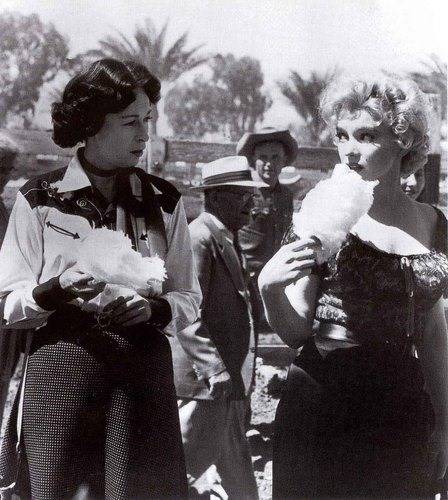
Eileen Heckart and Marilyn Monroe on the set of Bus Stop. Photo courtesy of Luke Yankee.
CL: Marilyn Monroe is one of the most written about and most talked about actresses to this day. What was it about your play that brings another color or shade into the mythological Marilyn Monroe universe?
LY: One of the things I wanted to highlight was what a smart businesswoman she was. Obviously, this is the complete opposite of most of her film roles where she plays the vulnerable, air-headed victim. Bus Stop was also the first film where she was a producer. In that day and age for a woman to have her own production company was ludicrous. The Joshua Logan character (the director of Bus Stop) in my play says, “Have you ever heard anything so crazy as an actress having their own production company?” It was unheard of back then. Nowadays, it’s common practice for popular actors to also participate as producers in their own films. My mother would tell stories about how speedily and proficiently Marilyn would go through a proof sheet of photographs with a grease pencil. Marilyn knew her own image so well, and she knew how to market herself.
I also wanted to highlight Monroe’s love of children. My brothers, Mark and Phillip were on the set of Bus Stop and she adored those boys. I love to say Marilyn Monroe was our family babysitter because she would often play games with my brothers. In fact, when they were on location in Phoenix shooting the rodeo scenes for the film, Marilyn had the top-floor suite at the hotel, and my mother’s suite was one floor below. One of the nightly rituals involved oranges and grapefruits from these elaborate gift baskets she was constantly being sent by producers and agents who were trying to gain favor with her. Marilyn would take the fruit, go out onto the patio and play catch with my brothers on the balcony below. Because Mark and Phillip were so little, they couldn’t catch any of them, so they would roll off mom’s balcony and down to the pool area below. This anecdote gave me a lot of insights into Marilyn’s deep desire for children.
CL: After the play was written, what happened next?
LY: In 2019, I did my first reading of the play at my clubhouse in Long Beach and invited a small group of people whose opinions I respect. When the play ended, the room was silent. My initial thought was, “Oh, God. They hated it, and nobody knows how to tell me.” Then, as I looked around the room, I realized they were all sobbing. Seeing everyone crying made me realize there might be something in this play.
During the pandemic in order to keep it going, I did two Zoom readings, one as a benefit for the Entertainment Community Fund and the other for Broadway Cares/Equity Fights AIDS. Between those two online readings, we raised nearly $5,000 to help artists who were affected by the COVID shutdown.
In 2021, after receiving an award from Southwest Theatre Productions, the play had its first in-person reading since 2019. Other readings then followed at the Stella Adler Studio, UC Irvine, Manhattan Theatre Club, and at Wagner College after the play received the Stanley Drama Award in 2022 (one of the past recipients was Terrance McNally for his play, And Things That Go Bump in the Night, which ironically, starred my mother on Broadway).
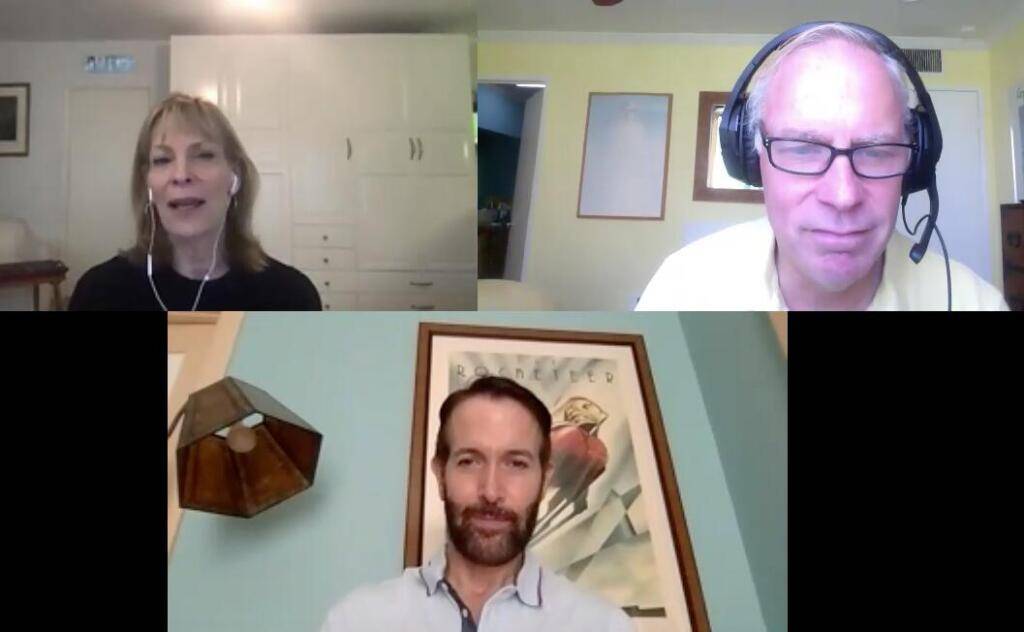
Actors Laura Gardner and Brian Rohan in rehearsals with playwright/director Luke Yankee for a Zoom presentation of Marilyn, Mom & Me. Photo courtesy of Luke Yankee.
CL: Since it’s first reading, what has been the biggest change in the development of the play?
LY: While nurturing the play, I added two characters. The first was Rosetta LeNoire, who ran AMAS Repertory Theatre in New York and was a major force in fighting for diversity in the American theater. Rosetta was my mother’s best friend and was one of the few people who could say to the flinty Miss Heckart, “Heckie, cut the crap!” and get away with it. She serves an important role as a foil and voice of reason to Eileen.
The other character I added was Ella Fitzgerald. Marilyn had a significant impact on Ella’s career and it was because of Marilyn’s admiration for Ella that she was able to start playing in the big clubs of the day. Not many people know this and I wanted to bring attention to their friendship.
It started when Marilyn’s vocal coach wanted her to learn about phrasing and instructed her to listen to Ella Fitzgerald’s Gershwin album 100 times. Marilyn did as she was told and immediately became a fan of Ella. Monroe would later vouch for Ella to play The Mocambo, the famous Los Angeles nightclub. When the owner of The Mocambo rejected the idea (not because Ella Fitzgerald was black but due to her dimensions), Marilyn said, “If you book Ella Fitzgerald for ten nights, I will book a ringside table, and I will fill the table every night and fill it with the biggest celebrities in town.” How could the owner refuse an offer like that?!
I spoke to Geoffrey Mark, a biographer and authority on Ella Fitzgerald, to verify the story. I asked him when this occurred. He got this little smirk on his face and said, “It happened in 1956 during the shooting of Bus Stop, and your mother was one of the guests at The Mocambo.” Well, you could have knocked me over with a feather. Of course, I had to put that into the play!
CL: Is there anything else you would like to add about your play?
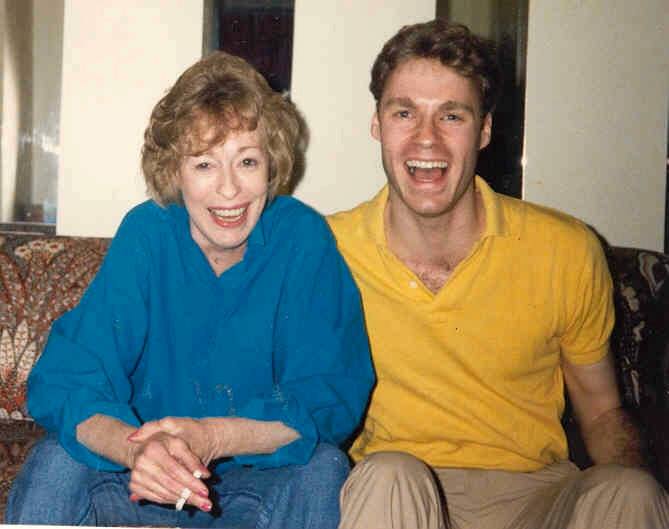
Actress Eileen Heckart with her son, Luke Yankee. Photo courtesy of Luke Yankee.
LY: I’m very excited about the production at International City Theater and to be directing it myself. This would be a hard one for me to turn over to anyone else because it’s such a personal story. It really is an A-list team of designers who have worked at The Hollywood Bowl, the Geffen Playhouse and South Coast Repertory, in addition to an A-list cast as well. Alisha Soper, who plays Marilyn, is Ryan Murphy’s go-to person to portray Ms. Monroe and he has used her in a couple of his television shows. Laura Gardner, who plays Eileen, is simply amazing. She has major Broadway and regional theater credits, including the New York productions of The Cocktail Hour and Smile. Brian Rohan, an Emmy-winning actor, plays Luke. These three actors have been with the play since the very first reading.
The other two cast members are Noah Wagner, a veteran of three of my other plays, who works all over the Southland. He plays Arthur Miller, director Joshua Logan, and a variety of other roles. And Jacquelin Lorraine Schofield plays Rosetta and Ella. She is a very gifted actress who works constantly, having played leading roles in regional productions of Sister Act, In The Heights, and The Color Purple.
As for the play itself, there are no holds barred. It’s Marilyn, Eileen, and Luke, warts and all. But I wouldn’t have you think this is my personal version of Mommie Dearest—quite the opposite. Ultimately, Luke’s character has a sense of redemption because he realizes the good intentions behind the harsh criticism of his mother. If there were any things that I was still harboring about the complexities of our relationship through writing this play, I was able to let go of them. That is a tremendous gift I’ve given myself because I am very vulnerable and exposed in this play. I received a lot of insights into my relationship with my mother, and it enabled me to forgive her on a deeper level. After all, forgiveness is a gift you give yourself.
For further information about the play, go to https://marilynmomandme.com/ To reserve tickets for the ICT production (running Feb. 14-March 3), go to ictlongbeach.org.

His television specs and pilots have all won or been finalists in major contests: The Lavender Mafia (finalist, Sundance Episodic Lab), Nurse Jackie: Anita Vicodin (winner, Scriptwriters Network Television Outreach Project), Royal Pains: Little Miss Conception (finalist, Warner Bros. TV Writers Workshop), The Lavender Mafia (finalist, NexTV Pilot competition) and Brothers & Sisters: Alabaster Shards. (winner, Best Drama, Scriptapalooza). His screenplay version of The Last Lifeboat was one of ten scripts chosen internationally for the DreamAgo Screenwriting Workshop in The Swiss Alps. As a professional director, Mr. Yankee has worked on and off Broadway at venues ranging from Radio City Music Hall to the ms Crystal Symphony, assistant directed six Broadway shows and has served as artistic director of two regional theaters. His latest book, The Art of Writing for The Theatre: An Introduction to Script Analysis, Criticism & Playwriting, is published by Bloomsbury Press and includes interviews with David Henry Hwang, Marsha Norman, David Zippel, Ben Brantley, Octavio Solis, David Lindsay-Abaire and a dozen other award-winning playwrights, lyricists, and critics. He is an adjunct professor at Chapman University and the Head of Playwriting at the University of California, Fullerton. www.lukeyankee.com
Colden Lamb is an actor, writer, and theater educator located in Southern California. coldenlamb.com
This post was written by the author in their personal capacity.The opinions expressed in this article are the author’s own and do not reflect the view of The Theatre Times, their staff or collaborators.
This post was written by Colden Lamb.
The views expressed here belong to the author and do not necessarily reflect our views and opinions.



